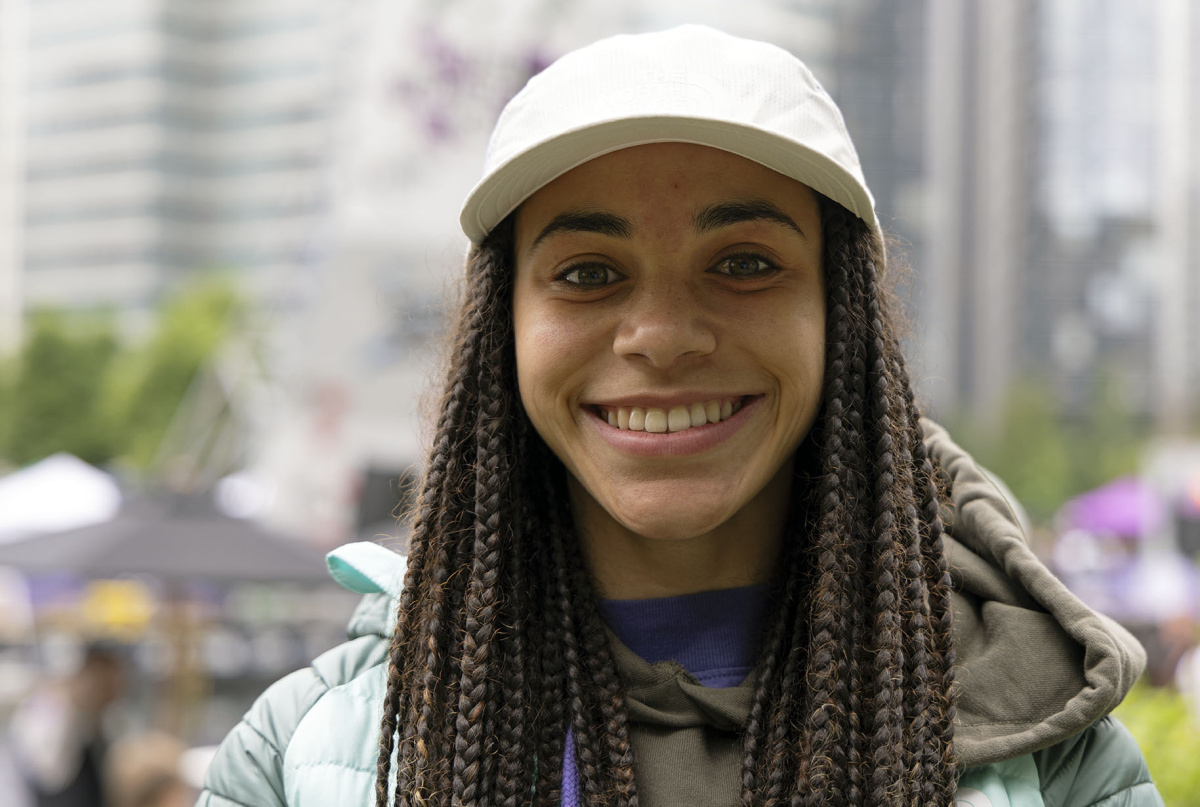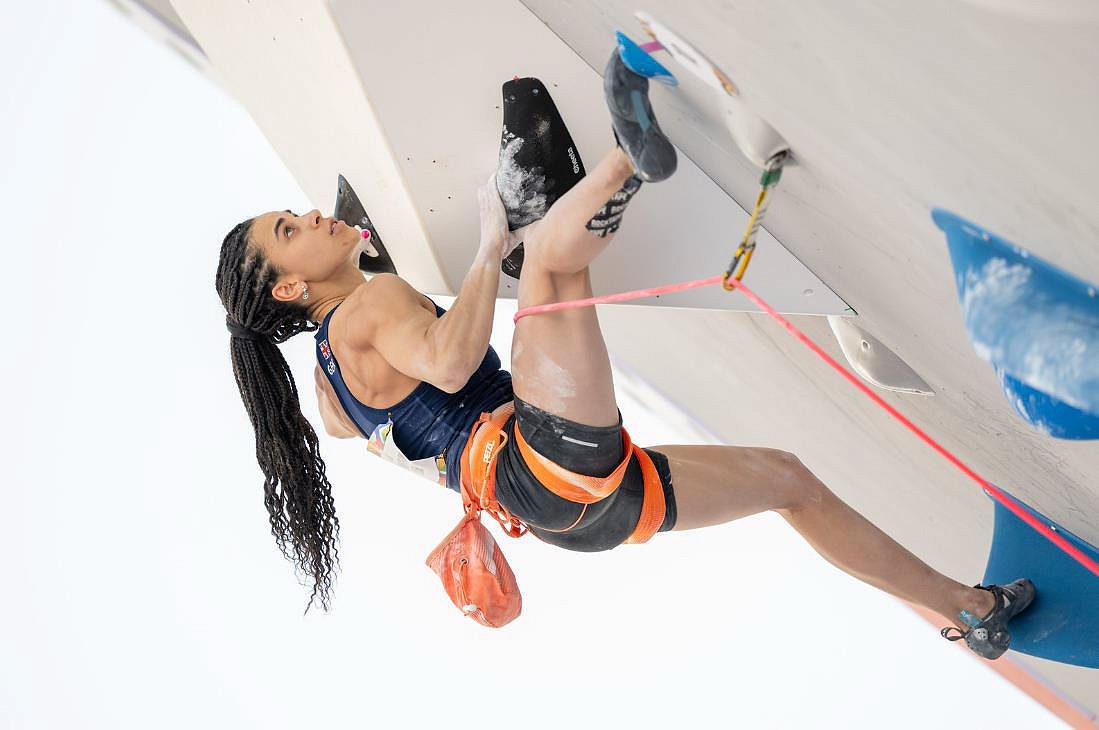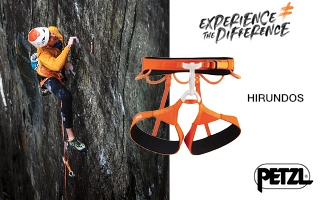Molly Thompson-Smith – GB Olympic medal hopeful talks to Climber
- Friday 2nd August 2024
 Four climbers will make their Olympic Games debuts this summer for Team GB at the Paris 2024 Olympic Games.
Four climbers will make their Olympic Games debuts this summer for Team GB at the Paris 2024 Olympic Games.
Toby Roberts and Hamish McArthur are set to become Team GB’s first-ever male climbers at an Olympic Games. Erin McNeice and Molly Thompson-Smith are also set to feature at their debut Olympic Games, three years after Shauna Coxsey competed for Team GB in the Olympic Games' inaugural sport climbing event at Tokyo 2020.
With the climbing segment of the Paris Olympic games due to start on 5th August, David Simmonite caught up with one of Team GB medal hopefuls, The North Face athlete and five-time British Champion Molly Thompson-Smith at the recent The North Face Climbing Festival in London.
Molly has developed into one of GB's most accomplished sport and competition climbers winning IFSC Lead medals. Her journey to the Olympics was little short of a Herculean epic of monumental proportions. Molly’s Olympic dream came true when she qualified for Paris having finished the OQS Series in 13th overall but took the crucial 12th and final qualification place after Fataba Ito was eliminated from the rankings given that two other Japanese team members had already qualified.
Understandably the conversation quickly got around to the Olympics, how she got there and any tips for climbers wanting to follow in her footsteps.
Congratulations on your Olympic qualification, you must be delighted. You nearly qualified for the last Olympics, so how does it feel now that you’re on the starting grid for Paris along with all the rest of the world's best competition climbers?
I'm just over the moon, it's been a journey since Tokyo but even longer than that really. I've always wanted to go to the Olympics, I remember watching it on TV with my parents. When I was super young and just thinking, wow, what a stage, you know what a group of athletes. How amazing is it that this kind of event in sport can unite the country and so many countries across the world. So to be there myself has been a dream for so long and I'm just so happy that I managed to make it happen, especially after not qualifying for Tokyo and having so many injuries along the way. It seemed more unlikely I guess, with each year that I was on the circuit and with each injury. So yeah, I'm just completely over the moon. Excited, a little bit relieved and just grateful for the opportunity to go out there and be one of the best 20 finalists.
You suffered a broken ankle a while ago, how was the recovery from that and did the thought of the Olympics motivate your rehab?
Definitely. It's funny because as soon as I fell off Swavito [a highball boulder problem at Gardom’s in the Peak District] and realised I properly hurt myself. The first thing I thought was, oh no, that's Paris gone and so it was like always a part of the journey from the very beginning. At first, it was daunting, but then it became my motivation. It was the reason I got out of bed every day. It was the reason I went to the gym to try and recover as fast as I could and I'm genuinely grateful for having Paris through that because it made me try and rehab as quickly as possible. It helped me because I could have easily just sat on the sofa and taken as long as I wanted really. But yeah, it helped me come back from that even quicker. I'm also grateful for the injury because I think without it, it would have been a lot harder to qualify.
The process for Tokyo took a lot out of me and it was really hard and I felt pretty demoralised afterwards. I've been competing for a long time in the circuit now – same thing every year. So having these new challenges and having to adapt and work really hard at something that was kind of different to what I was used to doing, like going to the gym and rehabbing and actually seeing progress every day. My uncle was really motivating and helped me to stay inspired and fired up.
How was the qualification process, the Olympic Qualification Selection looked very tough all around.
It was brutal because you have the OQS but qualification started a year before that. You had to qualify to get to the qualifiers and so it was more than just two events. It was a year and a half in the making. The events themselves were incredible. It was cool that climbing was part of the multisport event with breaking, BMX and skateboarding, and really special for climbing to be around other sports and made it feel more real. Like the idea of the games being more real, I guess. But it was also really hard and you could tell that the stakes were higher at this event and everyone was kind of a bit more intense than usual and then being in China is difficult anyway I would say, and then having to compete in the heat and everything being different and unusual, but then also being one of the most important competitions. It was brutal and having only 12 spots at the end of it, only 12 people were awarded out of the 50-odd that took part pretty much. What was tricky was that you had an idea of who was going after the first one [qualifying event], but it was still so open. So you had a month of still thinking of all the what-ifs and what could happen, what might not happen and so it was just a really stressful two months basically on the end of an already really stressful year.
 How did you use our existing training facilities in the UK to keep yourself rounded across different styles you will encounter at the games?
How did you use our existing training facilities in the UK to keep yourself rounded across different styles you will encounter at the games?
I love the UK, I don't think it's the easiest environment to train in for competition style, but I think there's a lot to be said for training in your comfort zone and I really use and lean on the support that I had around me; the people around me. The kindness of the gyms in the UK hosting us for training and doing whatever they could to support us because the Olympic style is different. We've got the 5, 10 and 25 points on the boulders and routes that get progressively harder, so it is kind of a new challenge for all of us and I'm very grateful to every wall that supported the team in any way they could, whether that's free entry and setting for us. Just doing their best to help where they could.
What kind of support do you get regarding coaching, physio and mental training?
Most of the athletes on the team aren’t funded so a lot of the journey was a self-funded process and either using the kindness of people who wanted to help or just using what you had. My coach Ellie has been with me for a very long time and I'm very grateful for her trust and belief in my abilities, even on the days when I couldn't believe in myself and I didn't think it was possible. So yeah, I spent a lot of time with her, my partner Sam, and my parents and my training found the position using the psychic energy from the people around me.
How is the team camaraderie – do you all feed off each other in terms of motivation and training tips?
For me personally, it's a team that I'm not as comfortable with as the previous generation. I feel like a lot of the athletes that I grew up with have retired now and gone on to other things and the rest of the team is quite young. I'm not old by any means but there's a good four to eight years between me and the rest of the Olympians I think and it definitely feels like that sometimes, but it's also been the most inspiring couple of years. I feel like the depth of the team has really deepened. There are so many more new faces coming up and doing incredible things on the international stage. It might not be the team I grew up with, but it's a team I'm proud of and I'm super inspired by.
Given GB is one of only four countries – along with Japan, France and the USA – sending a full quota of four athletes to Paris, you and the rest of the squad have done amazingly. If GB is to sustain a high ranking on the world climbing stage what improvements would you like to see to our training facilities and squad support as the next cohort of Olympic hopefuls come through?
Unfortunately, I think money is very helpful. Having more funding and money to help support the team we could do quite a lot. I'm really impressed with what we've managed to do with really limited funds so far and I think that just is a testament to everyone's hard work and the kindness of the climbing walls and route setters across the UK who will put as much as they can in so far without too much financial reward, I guess.
But I think as great as our facilities are they're not specialised for comp climbing and so, more comp style setting could be helpful. Similar walls to what we see in Innsbruck [Austria] basically. I still think we are missing that amazing lead wall in the UK and hopefully, it’s coming soon. An improvement in facilities would do a lot and we wouldn’t have to travel to train so much.
How do you relax at a competition – music, quiet time…
A lot of coffee drinking happens at competitions – the maps on my phone are full of pins for coffee shops and generally going out with the team, not even chatting a lot of the time, although we do chat a lot, just trying new coffee and hanging out. It’s probably the easiest way to see a new place without expending a lot of energy. As cool as it is to go to places like Shanghai or Budapest, unfortunately, you don’t get to see the place too much because you are either by a climbing wall or are supposed to be resting for your event. So drinking coffee or trying some local foods is probably the way I get to enjoy being away in these cool places without doing too much.
What would you say to any climber who wishes to follow in your footsteps and qualify for the Olympics? Any tips?
It's going to be a hard journey but to make sure that you have a good support network around you and you remember that, as amazing as the Olympics is, it's not everything. It's not everyone can go but it doesn't mean you're not a fantastic climber or a fantastic person if you don't make it.

